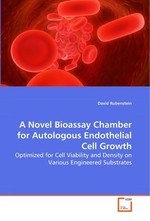Tissue engineering is an interdisciplinary field which focuses on scaffold design to aid in tissue replacement. One major difficulty involves the lack of vasculature within these scaffolds. This leads to replacement failure. We take the approach to fabricate a scaffold that directs endothelial cell (EC) migration to form planar capillary networks. In vivo, a combination of topological, mechanical and chemical cues dictates migration. Here, scaffold composition, surface chemistry and shear stress were used to direct migration. Experiments were designed to optimize electrospun scaffolds for ECs. Results indicated that ECs prefer to grow along fibers with a 1-5 micron diameter. A novel bioassay chamber was designed to optimize EC growth from an autologous donor source. Murine aortas were dissected, cannulated and perfused at low flow rates. Cell density was unrelated to flow rate, but viability was enhanced with higher flow. Long term culture increased cell viability without affecting density. This work should help elucidate a new method to engineer blood vessels and should be useful for anyone interested in optimizing biomaterial scaffolds for use with ECs.
Данное издание не является оригинальным. Книга печатается по технологии принт-он-деманд после получения заказа.


